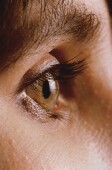 |
 |
 |
||
    |
||||
|
||||

Certain Diabetes Drugs May Pose Eye Risk
Use of Avandia, Actos tied to a retinal disorder, study finds|
|
HealthDay
By Robert Preidt
Tuesday, April 7, 2009
 TUESDAY, April 7 (HealthDay News) -- A class of diabetes drugs called glitazones are associated with an increased risk of a vision-threatening complication called diabetic macular edema (DME), which features swelling and fluid accumulation in the retina.
TUESDAY, April 7 (HealthDay News) -- A class of diabetes drugs called glitazones are associated with an increased risk of a vision-threatening complication called diabetic macular edema (DME), which features swelling and fluid accumulation in the retina.
Glitazones are a newer class of diabetes drugs that includes medicines such as pioglitazone (Actos) and rosiglitazone (Avandia).
The U.S. study of 996 DME patients found that those who took glitazones were 2.6 times more likely to develop DME than those who didn't take the drugs. Even after adjusting for other factors, the risk of DME remained 60 percent higher for patients who took glitazones, said the researchers at the Southern California Permanente Medical Group.
The study, published in the April issue of the American Journal of Ophthalmology, isn't the first to suggest a link between glitazones and DME. But it does confirm that the drugs are "modestly associated" with increased risk of DME, which is a common complication of diabetes.
"When treating patients with DME, ophthalmologists should consider the role of the glitazone class of drugs," the study authors concluded.
"Ocular (eye) complications are an overlooked safety issue of systemic drugs," noted Dr. Thomas J. Liesegang, editor-in-chief of the American Journal of Ophthalmology.
"Safety is as important as the efficacy of a drug. However, long-term safety is not currently monitored, because the approval process is based on smaller, shorter-term clinical trials. Safety necessarily requires monitoring of treatment in larger groups of people over longer periods of time. This monitoring is often neglected and should be required of all therapies," Liesegang said.
HealthDay
Copyright (c) 2009 ScoutNews, LLC. All rights reserved.
Related News:
More News on this Date
Related MedlinePlus Pages:
| Home | Health Topics | Drugs & Supplements | Encyclopedia | Dictionary | News | Directories | Other Resources | |
| Disclaimers | Copyright | Privacy | Accessibility | Quality Guidelines U.S. National Library of Medicine, 8600 Rockville Pike, Bethesda, MD 20894 National Institutes of Health | Department of Health & Human Services |
Date last updated: 08 April 2009 |
